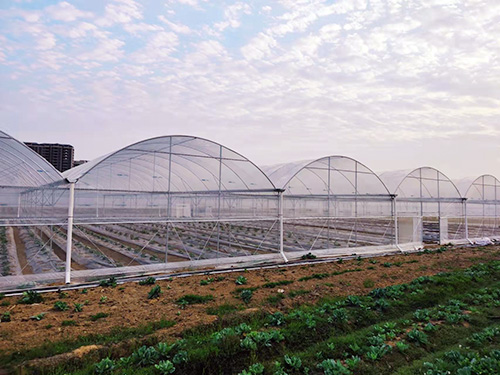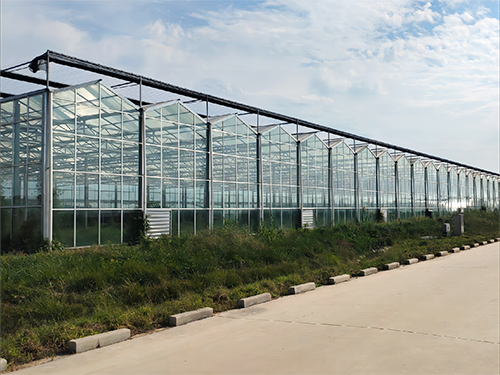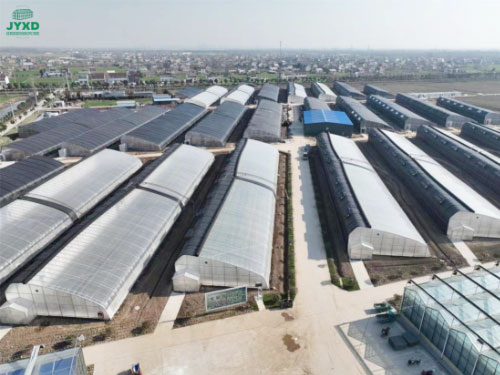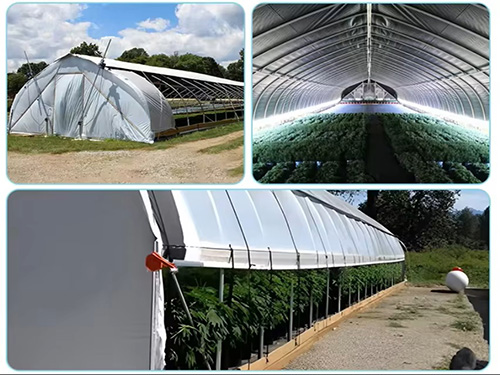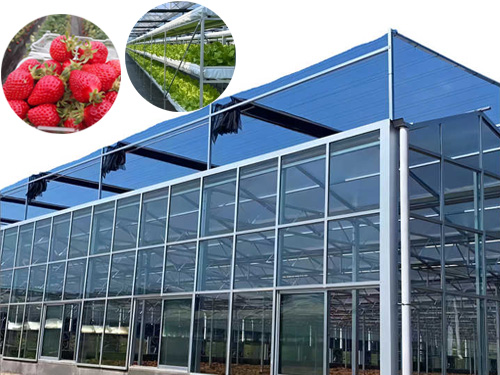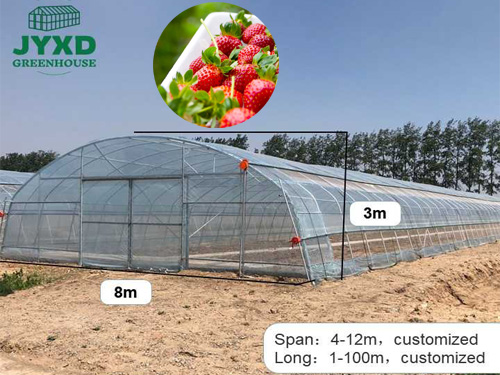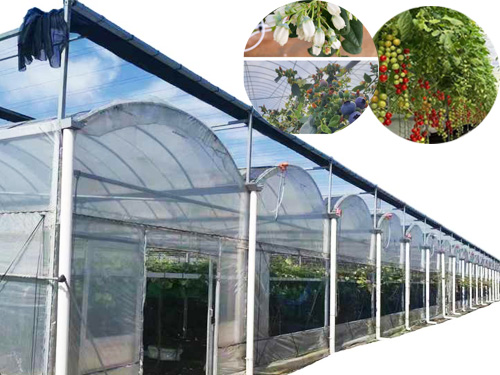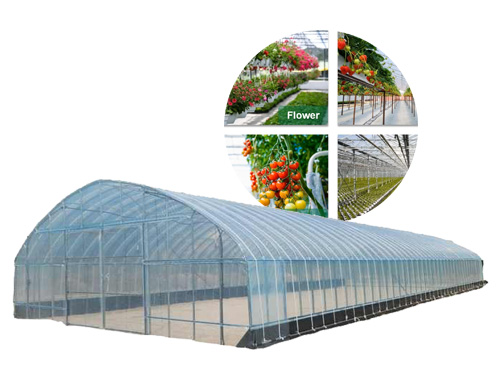NEWS DETAILS
NEWS INFORMATION
Winter Greenhouse Insulation Methods: Thermal Blankets & Geothermal Heating Case Studies
AUTHOR:jyxd-greenhouse DATE:2025-04-13 19:53:45 HITS:129
Winter greenhouse operations face the challenge of maintaining optimal growing conditions despite plummeting temperatures. Effective insulation is essential to protect plants, reduce energy costs, and ensure year-round productivity. Among the most innovative solutions are thermal blankets and geothermal heating systems. This article explores these winter greenhouse insulation methods, supported by real-world case studies, to help growers achieve sustainable and efficient winter cultivation.
Why Winter Greenhouse Insulation Matters
Winter conditions can severely impact greenhouse operations:
· Temperature Drops: Cold weather can stress plants and slow growth.
· Energy Costs: Heating greenhouses during winter can be expensive.
· Frost Risk: Frost can damage or kill sensitive crops.
Proper insulation helps maintain stable temperatures, reduce energy consumption, and protect plants from extreme cold.
1. Thermal Blankets: A Cost-Effective Insulation Solution
Thermal blankets, also known as energy curtains or insulating screens, are a popular choice for winter greenhouse insulation. They are made from reflective, insulating materials that trap heat inside the greenhouse.
How Thermal Blankets Work:
· Heat Retention: Blankets create a barrier that prevents warm air from escaping and cold air from entering.
· Light Diffusion: Some blankets allow light to pass through while retaining heat, ensuring plants receive adequate sunlight.
· Automated Systems: Can be integrated with automated systems for easy deployment and retraction.
Benefits of Thermal Blankets:
· Energy Savings: Reduce heating costs by up to 50%.
· Easy Installation: Simple to install and compatible with most greenhouse structures.
· Versatility: Suitable for both small and large greenhouses.
· Durability: High-quality blankets can last several years with proper maintenance.
Case Study: Tomato Greenhouse in Canada
· Challenge: High heating costs during harsh winters.
· Solution: Installed thermal blankets with automated retraction systems.
· Result: Reduced heating costs by 40% and maintained consistent tomato yields throughout winter.
2. Geothermal Heating: A Sustainable Insulation Method
Geothermal heating harnesses the Earth’s natural heat to warm greenhouses. It involves circulating water or air through underground pipes to absorb heat from the soil.
How Geothermal Heating Works:
· Ground Source Heat Pumps: Extract heat from the ground and transfer it to the greenhouse.
· Heat Distribution: Use fans or radiant heating systems to distribute warmth evenly.
· Energy Efficiency: Geothermal systems are highly efficient, using less energy than traditional heating methods.
Benefits of Geothermal Heating:
· Sustainability: Utilizes renewable energy, reducing carbon footprint.
· Cost-Effective: Lower operating costs compared to conventional heating systems.
· Consistent Temperatures: Provides stable heat, even during extreme cold.
· Long Lifespan: Geothermal systems can last over 50 years with minimal maintenance.
Case Study: Flower Greenhouse in the Netherlands
· Challenge: High energy costs and inconsistent winter temperatures.
· Solution: Installed a geothermal heating system with underground pipes.
· Result: Reduced energy costs by 60% and achieved consistent flower production year-round.
3. Combining Thermal Blankets and Geothermal Heating
Using thermal blankets and geothermal heating together can maximize insulation efficiency:
· Thermal Blankets: Retain heat within the greenhouse, reducing the workload on heating systems.
· Geothermal Heating: Provides a sustainable and consistent heat source.
Synergistic Benefits:
· Enhanced Efficiency: Thermal blankets reduce heat loss, allowing geothermal systems to operate more effectively.
· Cost Savings: Lower energy consumption and reduced heating costs.
· Improved Plant Health: Maintains stable temperatures, reducing stress on plants.
4. Best Practices for Winter Greenhouse Insulation
To maximize the effectiveness of winter insulation methods, follow these best practices:
Seal Gaps and Leaks:
· Inspect Structure: Check for gaps in walls, roofs, and doors that can let cold air in.
· Use Weather Stripping: Seal gaps with weather stripping or caulk to prevent heat loss.
Optimize Ventilation:
· Controlled Venting: Use automated vents to release excess humidity without losing heat.
· Insulated Vents: Install insulated vents to minimize heat loss during ventilation.
Monitor Temperature and Humidity:
· Use Sensors: Install temperature and humidity sensors to track conditions in real-time.
· Automated Systems: Integrate sensors with climate control systems for precise adjustments.
Maintain Equipment:
· Regular Inspections: Check thermal blankets and geothermal systems for wear and tear.
· Clean Surfaces: Keep greenhouse covers clean to maximize light transmission and insulation efficiency.
5. Benefits of Effective Winter Insulation
Implementing thermal blankets and geothermal heating offers numerous advantages:
· Energy Efficiency: Reduces heating costs and energy consumption.
· Year-Round Production: Ensures consistent yields even in winter.
· Sustainability: Lowers carbon footprint by using renewable energy.
· Cost Savings: Minimizes operational expenses and maximizes profitability.
Conclusion
Winter greenhouse insulation is essential for maintaining optimal growing conditions and ensuring year-round productivity. Thermal blankets and geothermal heating systems are innovative solutions that provide cost-effective, sustainable, and efficient insulation. By combining these methods and following best practices, growers can protect their crops, reduce energy costs, and achieve successful winter cultivation.
For more expert tips and high-quality greenhouse solutions, visit our website and take your farming practices to the next level. Let’s grow smarter and cultivate a greener future together!
![]()
Meta Description: Discover how thermal blankets and geothermal heating systems can optimize winter greenhouse insulation. Learn strategies for reducing energy costs and ensuring year-round productivity.
Hebei Juyou Xinda Greenhouse Facilities Co.,Ltd.
Copyright © 2024-2025 https://www.jyxd-greenhouse.com. All Rights Reserved Hebei Juyou Xinda Greenhouse Facilities Co.,Ltd.Copyright




 Current Location:
Current Location: